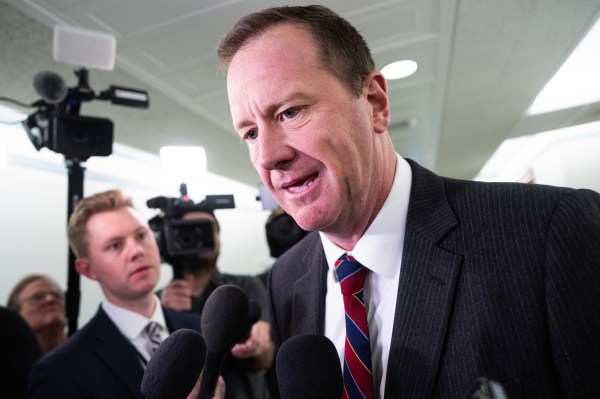Sen. Thom Tillis of North Carolina and Rep. Don Bacon of Nebraska are two legislators known around Capitol Hill for their good nature and collegiality. As representatives of a swing state and a swing district, respectively, their seats were among the top pick-up opportunities for Democrats who hope to make the most of the political headwinds that are likely to blow against their opponents in the 2026 midterms. Now both will finish out the rest of their terms and give way to future nominees of their party.
The two are the latest in a series of legislators who have demonstrated a willingness to cross the aisle and work on legislation with their political opponents but have chosen to leave Congress in an era of deepening partisan divisions and increasing vitriol. With their departures, the Republican Party also loses two federal lawmakers willing to break with Trump.
In his statement announcing his decision not to seek reelection to a third term, Tillis was up front about his dissatisfaction with a lack of bipartisanship in the legislative branch. “In Washington over the last few years, it's become increasingly evident that leaders who are willing to embrace bipartisanship, compromise, and demonstrate independent thinking are becoming an endangered species,” he said. He made reference to former Sens. Kyrsten Sinema of Arizona and Joe Manchin of West Virginia, two Democrats who later left their party to become independents, as people “who were dedicated to making the Senate more of a functional and productive legislative body,” lamenting their decisions not to seek new terms in 2024.
The reluctance of Republicans and Democrats to work together to keep Congress running has emboldened presidents of both parties in the past decade and a half to push the boundaries of executive authority and weaken the legislative branch, something Tillis likely did not foresee as his political career took him from serving as a Cornelius, North Carolina, town commissioner to ousting a Democratic incumbent to win a U.S. Senate seat. While he served in the North Carolina House of Representatives during the 2010 election cycle, Republicans rode a backlash against then-President Barack Obama to take control of the chamber for only the second time since the end of Reconstruction. Tillis then became speaker, leading a powerful organ of the state’s lawmaking.
In North Carolina, “the legislative branch is dominant,” Dallas Woodhouse, who served as the executive director of the state Republican Party in the 2010s, told The Dispatch. “And so, I think he takes the role of a legislative branch seriously.”
Tillis has cosponsored bipartisan legislation the 12th most often of any senator, according to GovTrack. He voted for President Joe Biden’s Bipartisan Infrastructure Law and most recently worked to begin a Senate initiative meant to strengthen NATO. Though he voted for all of Trump’s Cabinet nominees, he gradually grew more willing to contradict the president, derailing the nomination of Ed Martin to be the U.S. attorney for Washington, D.C., with his opposition. As Republicans in Congress have tried to come to a consensus over the One Big Beautiful Bill Act, which contains most of Trump’s key legislative priorities for his second term, Tillis has been one of a collection of senators who have tried to moderate the changes to Medicaid sought by GOP leadership to cut spending. On Saturday night, Tillis voted against advancing the bill, becoming one of only two Republican senators to vote with the Democrats. The next day, the 64-year-old made his surprise announcement.
“What has happened a lot … when your party has everything, when you have the trifecta, is that the Congress just sends everything over to the executive, and Tillis doesn’t believe in that,” Woodhouse said.
Chris Cooper, a professor of political science and public affairs at Western Carolina University, noted the changes taking place in the Senate that have made serving in it less desirable. “There has been for a long time the idea—from the Founding—that the Senate is the ‘cooler’ branch, that it's the one that is a little bit more removed from partisanship,” he told The Dispatch. “They have longer terms. They represent the entire state. They're not supposed to be as responsive. And I do think there's something to the fact that that's changed, that the Senate looks more like the House than it used to.”
While Tillis’ decision not to run again has set off a scramble among potential candidates, a similar situation is taking shape in Bacon’s Nebraska district, which covers most of Omaha.
Among House Republicans, Bacon has been one of the most critical of Trump since the president began his second term. He has not been shy about his belief that Trump has brought the Republican Party away from the conservatism of Ronald Reagan and toward a more populist ideology on such issues as Russia’s war in Ukraine and tariffs. Trump appeared to reference Bacon as a “rebel Republican” after the fifth-term congressman introduced a bill that would see Congress claw back some of the power to levy import duties on other countries.
Rebel or not, Bacon has not been afraid to cross the aisle. According to GovTrack, Bacon ranks in the 97th percentile of Republican House members for signing onto bipartisan legislation and the 95th percentile for getting bipartisan support for his own bills. He was also rated as one of the most effective at getting his legislation passed into law.
In a press conference Monday in which he officially announced his decision not to run again, Bacon did not offer the same criticism of the state of affairs in Congress as Tillis did, instead citing a desire to be closer to his wife and the rest of his family. “We’ve worked four days out of seven in Washington, D.C., 12 to 14 hours a day. It’s time to come home, so I look forward to working in the area and walking in the door, saying hi to Angie every night,” he said.
But Bacon, 61, is holding fast to his devotion to Reaganite conservatism, especially on the issues of trade and foreign policy. “I have a voice on national security, and I want to be a voice for traditional Republican views that stem from Ronald Reagan,” he said. “My first campaign that I got involved in, I was 13 years old in 1976, campaigned for Ronald Reagan, and I haven’t changed.”







Please note that we at The Dispatch hold ourselves, our work, and our commenters to a higher standard than other places on the internet. We welcome comments that foster genuine debate or discussion—including comments critical of us or our work—but responses that include ad hominem attacks on fellow Dispatch members or are intended to stoke fear and anger may be moderated.
With your membership, you only have the ability to comment on The Morning Dispatch articles. Consider upgrading to join the conversation everywhere.